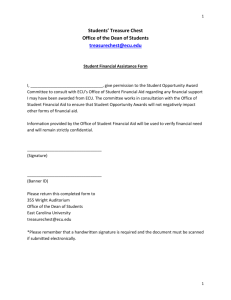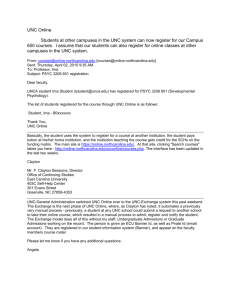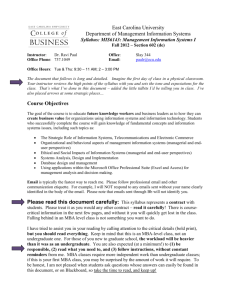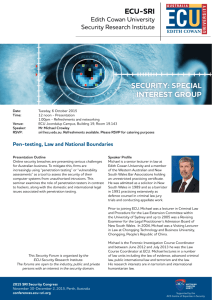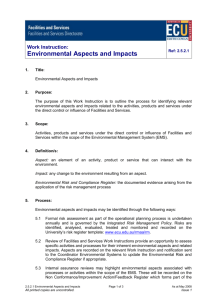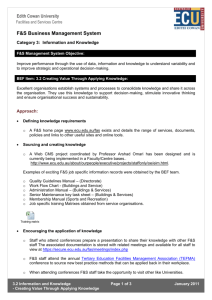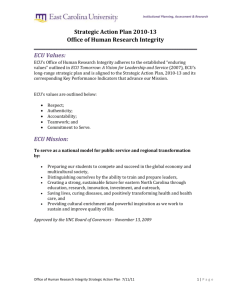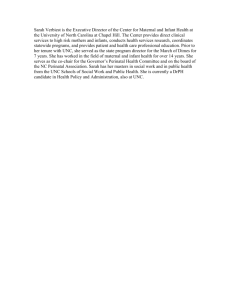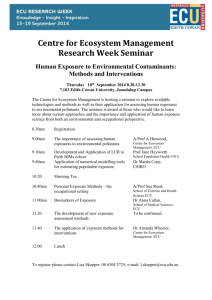DSCI 3023 - Management Science
advertisement
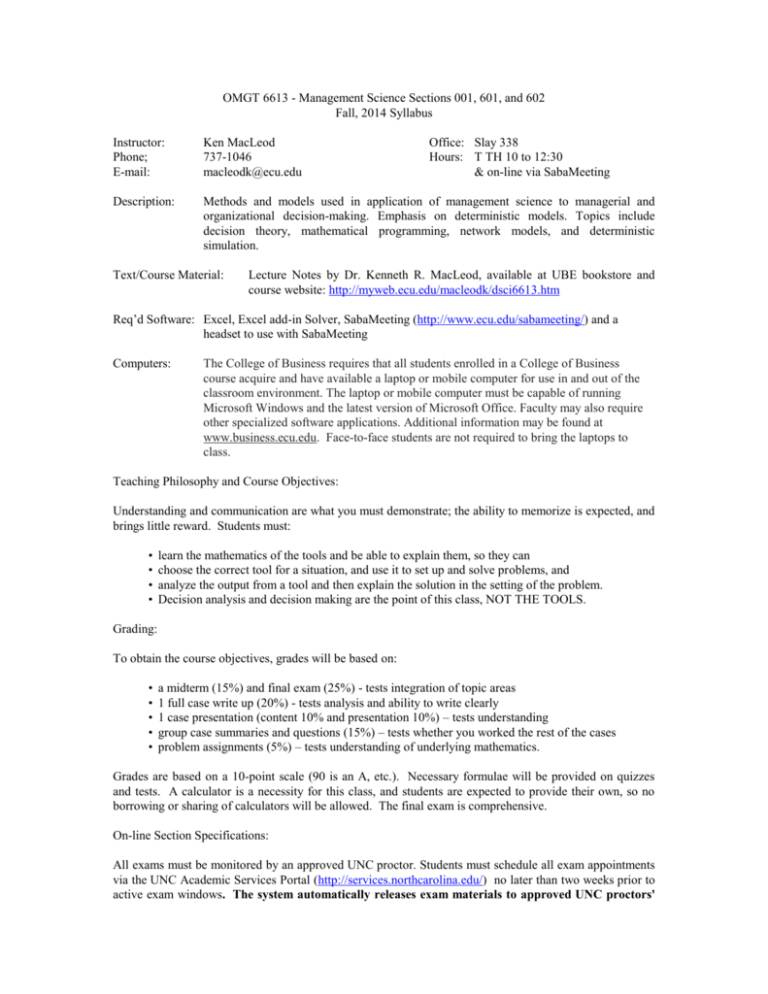
OMGT 6613 - Management Science Sections 001, 601, and 602 Fall, 2014 Syllabus Instructor: Phone; E-mail: Ken MacLeod 737-1046 macleodk@ecu.edu Description: Methods and models used in application of management science to managerial and organizational decision-making. Emphasis on deterministic models. Topics include decision theory, mathematical programming, network models, and deterministic simulation. Text/Course Material: Office: Slay 338 Hours: T TH 10 to 12:30 & on-line via SabaMeeting Lecture Notes by Dr. Kenneth R. MacLeod, available at UBE bookstore and course website: http://myweb.ecu.edu/macleodk/dsci6613.htm Req’d Software: Excel, Excel add-in Solver, SabaMeeting (http://www.ecu.edu/sabameeting/) and a headset to use with SabaMeeting Computers: The College of Business requires that all students enrolled in a College of Business course acquire and have available a laptop or mobile computer for use in and out of the classroom environment. The laptop or mobile computer must be capable of running Microsoft Windows and the latest version of Microsoft Office. Faculty may also require other specialized software applications. Additional information may be found at www.business.ecu.edu. Face-to-face students are not required to bring the laptops to class. Teaching Philosophy and Course Objectives: Understanding and communication are what you must demonstrate; the ability to memorize is expected, and brings little reward. Students must: • • • • learn the mathematics of the tools and be able to explain them, so they can choose the correct tool for a situation, and use it to set up and solve problems, and analyze the output from a tool and then explain the solution in the setting of the problem. Decision analysis and decision making are the point of this class, NOT THE TOOLS. Grading: To obtain the course objectives, grades will be based on: • • • • • a midterm (15%) and final exam (25%) - tests integration of topic areas 1 full case write up (20%) - tests analysis and ability to write clearly 1 case presentation (content 10% and presentation 10%) – tests understanding group case summaries and questions (15%) – tests whether you worked the rest of the cases problem assignments (5%) – tests understanding of underlying mathematics. Grades are based on a 10-point scale (90 is an A, etc.). Necessary formulae will be provided on quizzes and tests. A calculator is a necessity for this class, and students are expected to provide their own, so no borrowing or sharing of calculators will be allowed. The final exam is comprehensive. On-line Section Specifications: All exams must be monitored by an approved UNC proctor. Students must schedule all exam appointments via the UNC Academic Services Portal (http://services.northcarolina.edu/) no later than two weeks prior to active exam windows. The system automatically releases exam materials to approved UNC proctors' accounts, if you do not schedule via the system, you will be unable to take your exams. Login to the UNC ASP via the "UNC Member" tab (not the "External User" tab) to schedule exam appointments; detailed scheduling instructions are posted in Blackboard. If you have questions in regards to the UNC ASP contact: proctors@services.northcarolina.edu . Please note that students are responsible for all fees related to proctoring services (generally, with advanced planning, students can secure a proctor that does not charge a fee). During proctored exams, as at all other times, you are required to adhere to ECU’s Honor Code (http://www.ecu.edu/csacad/DEOrientation/honorcode.cfm). Upon arriving for the exam, please be prepared to present a current/legible photo ID. Cell phones are strictly prohibited during exam appointments (leave cell phones in a locked car, at home, or in the care of your proctor). A proctor should never request your login information, banking information, or social security number. The COB On-line Class policies require that at least 50% of the work come from assessments that can be directly attributed to individual students. For this class, the two exams fulfill part of this requirement and the presentation and participation grades will provide the rest. Each member of the presentation groups will be required to complete and return an evaluation form detailing to what extent each group member participated in preparing the case presentation. Based on these evaluations, an individual group member’s presentation grade may be decreased. Attendance: Students are responsible for everything said in class, including changes to the class schedule. Class sessions are recorded in SabaMeeting for review by all students, and missed deadlines may not be made up. Should weather or any other condition force the campus to close, the SabaMeeting session will still be held and face-to-face students will simply log in rather than coming to the classroom. If Blackboard or SabaMeeting is down, I will communicate with you by e-mail to arrange alternatives. If you will miss a deadline for an University approved reason, you must let me know in advance. If excused, the percentage weight for the midterm will be added to the final exam (I don’t recommend this). All assignments are handled via the “Assignments” page of BB, so it is not possible to accept late assignments. The written case will be submitted via e-mail to my current account, macleodk@ecu.edu (this makes my handling of the case write-ups much easier). Only EXTRAORDINARY excuses (not disk failure) are accepted for missing the case deadline, otherwise a late case receives a grade of zero. The University’s policy is that provided I state my rules clearly, the rules are valid. It is a harsh rule, but it is one I enforce, and you may contact me to hear my reasons for this rule, if you wish. Cases and Post-Presentation Discussions: The majority of the work in this class deals with five cases, applications of the techniques that are taught in the lecture notes. There are no lectures – students are expected to review the appropriate material before a class session begins, so that the classes can be devoted to helping the students understand the cases. It is important that you participate in the class sessions. If you can’t attend a session live, then send questions to me via e-mail. The case statements may not contain all the information you need to analyze the case. The answers to the questions will provide you with sometimes vital information for the analysis of the cases, so you need to both ask questions and listen to the answers. Each student will be assigned to a group and every student must substantially contribute to the group in the preparation of each case analysis. Failure to do so will result in a zero for that case. Each group will present one case. Each student must turn in their own written analysis (see “General Instructions”) of the first case. Finally, the groups will turn in a one-page summary of the remaining three cases, as well as participating in post-presentation Q&A sessions. The summaries and discussions make up your Participation grades (15% of your final grade). A spreadsheet showing what each group is responsible for will be sent to you after the semester begins. The on-line presentations will be via SabaMeeting, as will the discussions. If a student cannot attend the presentation via SabaMeeting, they must tell me in advance to receive permission to review the session at a later time. While the overall intent of the on-line class is that it be asynchronous, the live interaction between students in these discussions is an important training tool. I am reasonable in accepting reasons for missing the SabaMeeting presentations, but will strongly prefer that you make time to attend as many as possible. The dates of the presentations are in the class calendar. Cheating: For this class, cheating is defined as using any resource other than those specifically approved by me. For the cases, students may work together to set up the problem and prepare for the computer, but everything turned in must be the student’s own work. Copying from anyone – current students, previous students, or even from me – is unacceptable. I am the only judge of what will be considered excessive similarity between papers, which will be considered as cheating. Any violation of the ECU MSCM Department Academic Integrity policy will result in a failing grade in the course. Calendar: A tentative calendar will be sent to you and posted on the web site. East Carolina University seeks to comply fully with the Americans with Disabilities Act (ADA). Students requesting accommodations based on a disability must be registered with the Department for Disability Support Services located in Slay 138 (252) 737-1016 (Voice/TTY).
